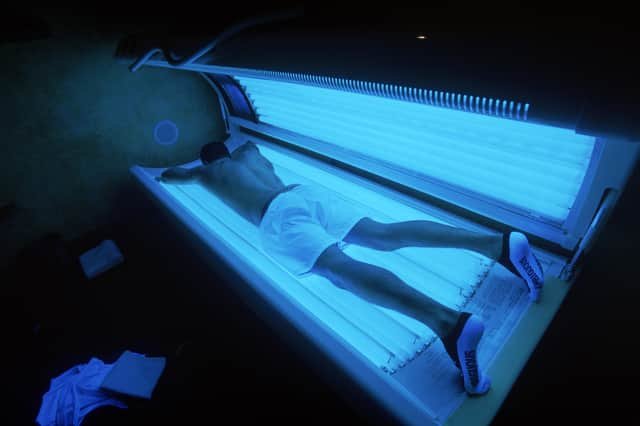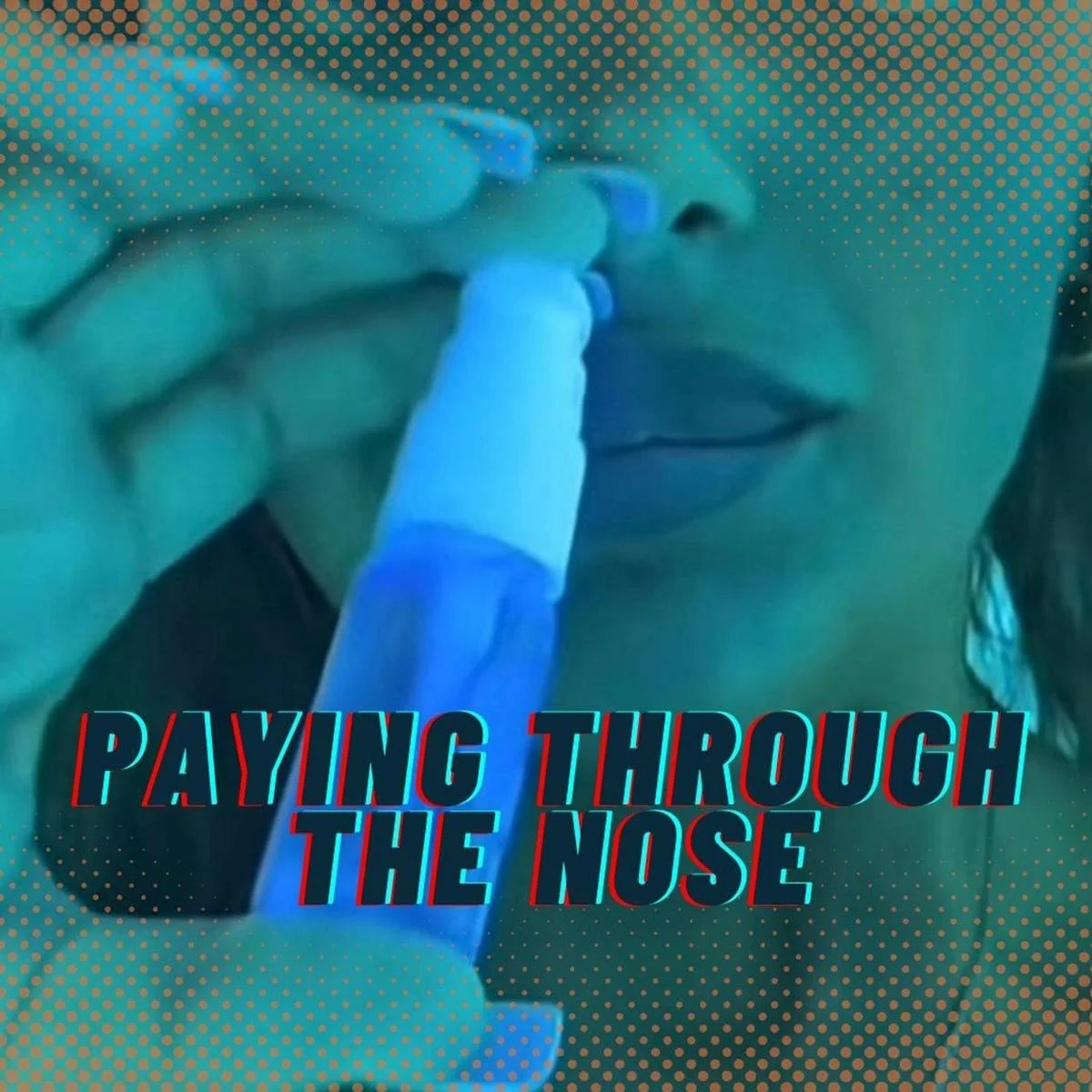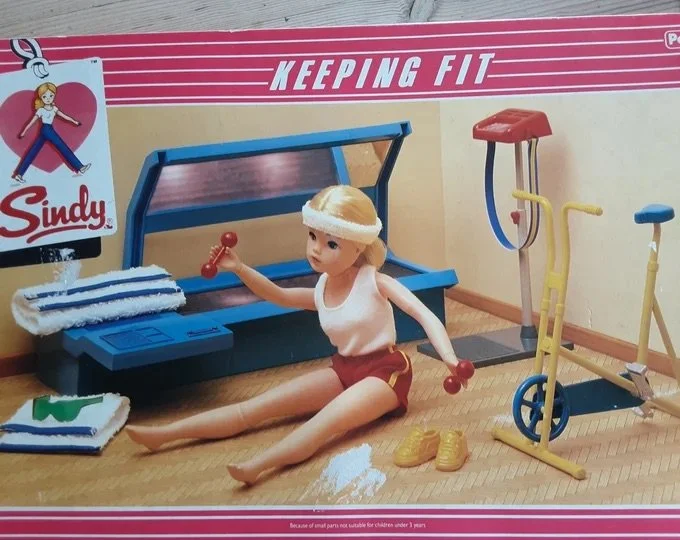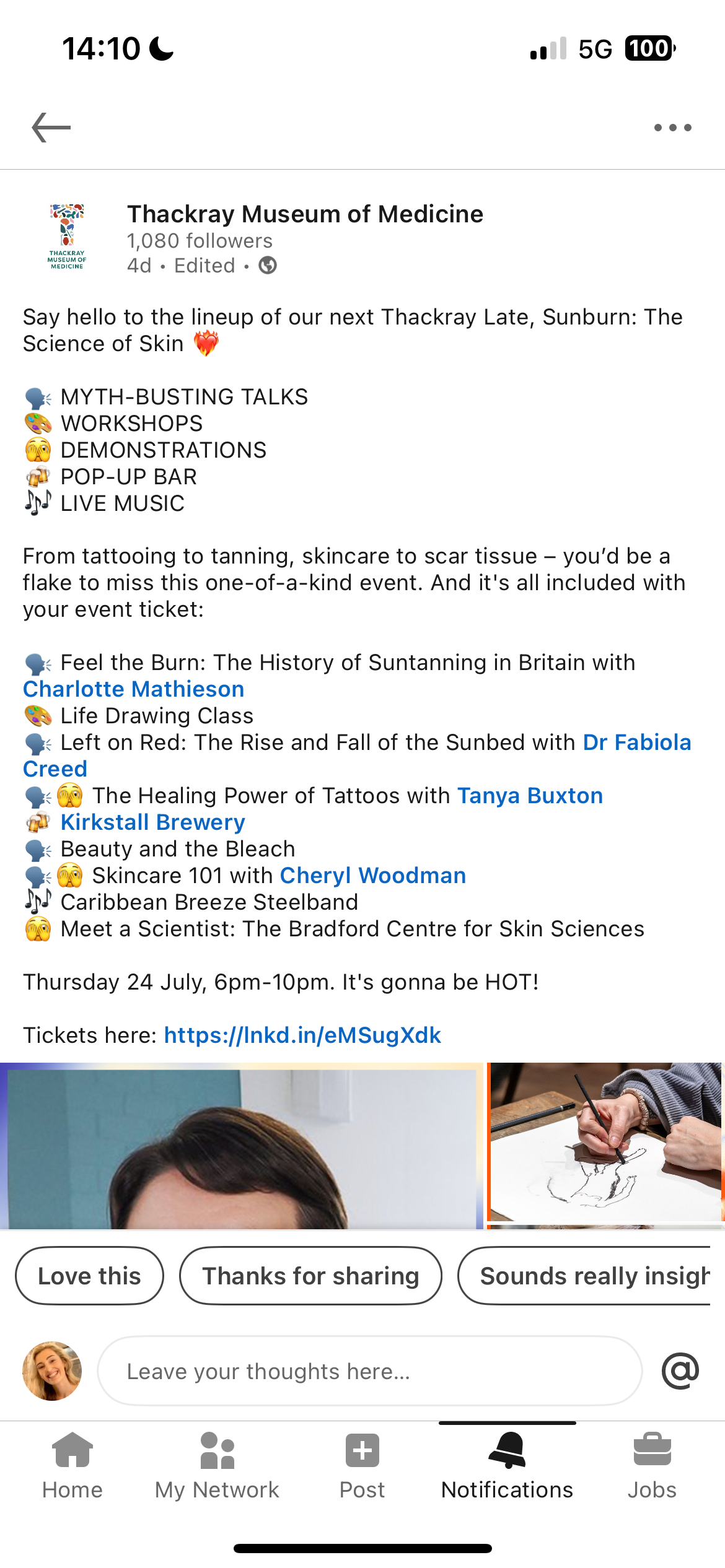Media / Public Engagement
-
Left on Red: The Rise and Fall of the Sunbed (Talks for the Thackray Medical Museum Event: 'Sunburn: The Science of Skin', Leeds), 24 July 2025.
Consider tanning culture and technologies in a new light, as Dr Fabiola Creed explores the history of fake tan, sunbeds, injections and film representations of all things suntan!
-

'Kicking the Habit: ‘Addictive’ Sport Sponsorship in Britain, 1965-2025', Polyphony (Conversations Across Medical Humanities), 4 April 2025.
Commercial sponsorship is ubiquitous in professional sports. From match-day programmes and pitch-side hoardings to players’ shirts and branded trophies, sponsors have developed creative ways to publicise their brands and products. Whilst sponsorship itself is not new, the pace and extent of its spread is a modern phenomenon. This includes the proliferation of sports sponsorship by ‘addictive industries’ – companies whose products and activities can result in long-term, damaging, and compulsive behaviours. Notable examples include the tobacco, alcohol and gambling industries, whose products pose serious risks to public health…
-

Dr Fabiola Creed, 'As 'tanning addicts' are publicly shamed and belittled, the real villains appear untouchable', Scotsman, 8 February 2025.
In popular culture, sunbed consumers are stereotyped as bad people: tanorexic chavs and neds, evil gold-diggers and bimbos, murderous psychopaths – and even zombies. We need look no further than the 45th and 47th US President, Donald Trump, for a topical example. The moral message is clear: sunbed use is ‘vain’ and ‘stupid’, and such grotesque consumers will experience fatal consequences for their wicked habits. Whilst white working-class people, young women, mothers, and both metrosexual and gay men are blamed for this reckless consumption, scientists and businesses continue to develop new tanning technologies
-

(Tanning Expert in) Kuba Shand-Baptiste, ‘What Trump’s Increasingly Orange Face Tells Us About Him’, I-news, 8 November 2024.
Over the years, the hue of the US President-elect's skin has been the source of much confusion - but experts have some compelling theories…
-

(Tanning Expert on) Alice Faulkner, ‘Tanning Injections and Nasal Sprays Rise in Glasgow’, Clyde 1/Glasgow Radio, 2 to 6 September 2024. AWARDED 'BEST NEWS SPECIAL' by the 2025 Commercial Radio News Awards.
Dr Creed historicises tanning injections (8.15 to 9.15 minutes) in Alice Faulkner’s 5-day investigative piece on ‘Tanning Injections and Nasal Sprays Rise in Glasgow’, Clyde 1 Glasgow Radio and Online Press: Faulkner, ‘We reveal health risks from popular nasal tanners’ 2 September 2024. Faulkner, ‘Nasal tanning spray investigation deemed 'terrifying’’, 6 September 2024.
-

'The Last Taboo of Motherhood?' Historical Audio Plays / Installation, Warwick's Arts Centre, Chester Storyhouse, Camden Library and Women's Library Glasgow, November 2023 to January 2024.
To break the silence on maternal mental health and women’s experiences in 20th-century Britain, Hilary Marland, Fabiola Creed and Kelly Couzens collaborated with 3 artists to create historically based audio plays. The audios explore the influences of maternal mental illness, from inter-generational mother-daughter relationships to racism and everyday gossiping. Funded by the Wellcome Trust and Warwick University. Produced by Fuel.
-

(Tanning Expert in) Jacqueline Kilikita, ‘SUN BLOCKED: Our Obsession With Tanning Is Rooted In Sexism & Here’s Why’, Refinery29, 29 June 2023.
From "sun-kissed" to a "healthy glow", the way we talk about being tanned is proof enough that we romanticise it. Add in the visuals, like adverts for luxury fashion or influencers posting on Instagram from a poolside in Ibiza, and its ever more apparent that a bronzed body has become synonymous with being attractive and healthy—even when we know a real tan can be deadly…
-

Fabiola Creed, 'Sunbeds, Tanning, and the Media', Working Group on Body Image, Eating Disorders and Social Media, 10 June 2021
Summer is around the corner and as many are headed for the tanning salons to achieve that sun-kissed look, have you wondered how this whole trend came about? Listen to Dr Creed talk about the invention of the sunbed and how its use and societal position have changed over time. Also, how does that relate to body image? And what is the role of the media? The ‘Working Group on Body Image’ is founded by Dr Petya Eckler (University of Strathclyde).
-

Louise Morgan and Fabiola Creed, 'Clean Eating and Tanning Injections as Cultural Phenomena', Warwick History Podcast, 2020.
In this episode, Fabiola Creed and Louise Morgan consider the dietary fad, clean eating, and tanning technologies such as 'MelanoTan'. They examine these cultural phenomena with reference to the financial elements imbricated in the advocation of these technologies and diets, as well as the way in which medical research intersects with public discourse in media representations of clean eating and MelanoTan.
-

From Beauty Glam and Bodybuilders to Psychopaths and Tanorexics: The History of the Sunbed Tan, 'Beauty School Drop In', Colchester Community Centre, AHRC Being Human Festival, November 2019.
Fabiola talked about the changing perceptions of sunbed users, and brought along a 1980s Sindy doll to highlight her point about sunbeds becoming mainstream. This prompted people to share their own sunbed experiences, laughing about the rush to use sunbeds! This event was organised by the ‘Body, Self and Family: Women’s Psychological, Emotional and Bodily Health in Britain, c. 1960-1990’ project team, Professor Tracey Loughran, Dr Daisy Payling, Dr Kate Mahoney, Dr Hannah Froom.
-

Fabiola Creed, 'Sunbeds: Are they simply an 'irrational' compulsion?', Beauty Demands Blog, University of Birmingham, 18 September 2017.
With such sunbed stigma in mind, how has this industry, worth millions of pounds, both persisted and thrived for over thirty years? And why do over millions of people in Britain continue using them every year? The popularity of the industry has drastically declined in many European countries. In comparison, the yearly rates of sunbed consumption have remained fairly constant in the UK…
-

My PhD Blog Posts, 'PhD Life: A Blog on Addictions, Bodies, Drugs, 'Excessive' Consumptions, Gender... and Sunbeds', Monthly in 2017.
This series of blogs in 2017 explored internet addiction, interpretations of ‘natural and ‘artificial’ body modifications, the importance of using history to inform policy, the history of stereotypes, and MDMA, club culture and gender normative practices.
